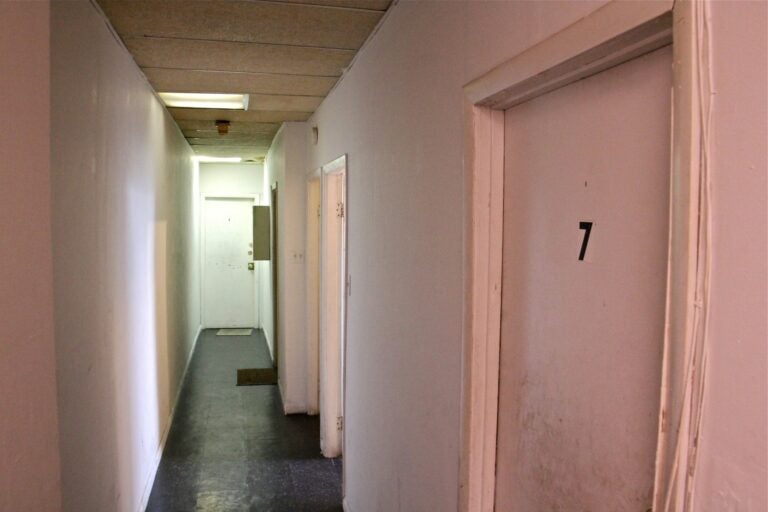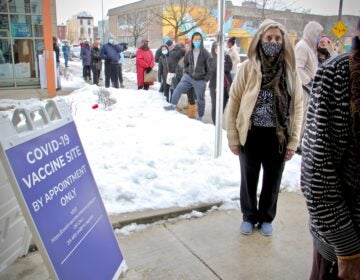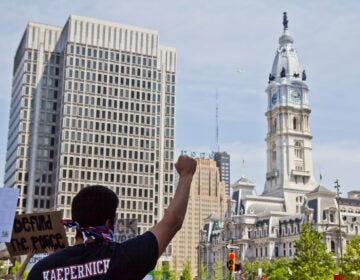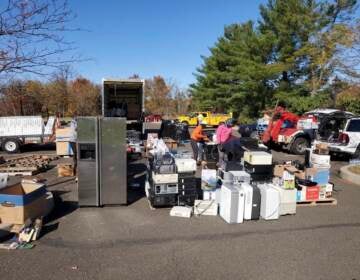Disrupting poverty in Philly with housing help for people returning from prison
Pa. has the second-highest imprisonment rate in the U.S. The Supervision to Aid Re-Entry (STAR) program connects returning citizens with the support they need.

A 2019 file photo of a North Philadelphia rooming house. Many returning citizens live in unregulated rooming houses because they have few other options. (Emma Lee/WHYY)
As we reimagine ways to disrupt poverty and achieve racial equity in Philadelphia and across the U.S., one key is making sure people have a stable place to return home after incarceration.
Philadelphia has the highest incarceration rate of any big city in the country, according to the city’s Office of Criminal Justice, as well as the highest poverty rate among major cities and a growing affordable housing crisis.
These facts have a lot to do with one another. The reentry system locally and nationally is fraught with disconnected systems that offer formerly incarcerated individuals few resources to meet their desired goals. Individuals are often required to do things like obtaining gainful employment and secure housing, despite the fact that increased background checks and technology advancements mean even a minor criminal record can negatively affect a person’s ability to obtain employment, housing, and transportation or further their education. This disconnect often leads to longer periods of supervision and re-incarceration.
But rather than a punitive approach that further penalizes a person for having a record on top of the punishment they have already served, what if we looked for ways to remove barriers for returning citizens and help individuals build assets that could set them up for success in their lives after returning home?
One such model is the Supervision to Aid Re-Entry (STAR) program, created in 2007 by the United States District Court for the Eastern District of Pennsylvania.
The program engages 30-40 participants per year from Philadelphia with a high risk of recidivism for violent crime. Participants attend 26 court sessions in front of a judge for 52 weeks, and if they successfully complete the program, they receive a full year off their term of supervised release.
Access to housing remains a significant barrier for many returning citizens — including participants in STAR. Without options, people turn toward unregulated room rentals, family members, or even other high-risk individuals for a place to sleep. To address this challenge, STAR recently partnered with Clarifi and the City’s Financial Empowerment Centers (FECs) to provide a full-time HUD-certified housing counselor who works closely with each participant, tracking their cases from the beginning of the program to the end. Through the program that launched in October of 2020, counselors develop trust and long-term relationships with participants to help them achieve their most important goals. This population can require more intensive partnership with their counselor to obtain and maintain stable, safe, and affordable housing, and to achieve other goals, such as opening a bank account, stabilizing credit and budgets, and making a financial plan for their future.
The program has reinforced the notion that investment in reentry and rehabilitation, as opposed to supervision and enforcement, can actually change the arc of an individual’s life and provide opportunities for economic mobility. It can reduce the amount governments spend on incarceration, allowing those resources to be redirected to education, workforce development, and other proven social services. It is a scalable solution that should serve as a model for reentry.
Beyond its partner at Clarifi, STAR features a diverse group of criminal justice system professionals representing organizations that provide high-impact services to program participants. These professionals and organizations include federal judges Timothy R. Rice and Luis Felipe Restrepo, the United States Probation Office, the Federal Community Defender Office, the United States Attorney’s Office for the Eastern District of Pennsylvania, dozens of volunteer law students and attorneys, and Fox School of Business financial literacy tutors.
Of the program’s 264 graduates, only 10 percent have had their supervision revoked, compared with the district’s 29.2 percent revocation rate for similarly situated individuals on federal supervision. By STAR’s estimations, this has not only saved supervision time for returning citizens, but has also saved taxpayers $2 million each year based on the annual cost of imprisonment. The program has rightfully earned national recognition, demonstrating that providing someone with the ability to navigate systems and access resources can prevent them from resorting to criminal activity to solve their financial woes.
What’s unique about STAR, in addition to the coordinated support, is that it also provides individuals with tangible assets. Participants who complete the work with their counselor can receive grants up to $1,000, which can have a significant impact on their ability to access housing, as many low-income Philadelphians, and especially returning citizens, often struggle to obtain the standard first/last/security deposit payment.
While reentry reform will not solve the disparities that exist within our criminal justice system, it is one piece of a complex puzzle that requires everyone to solve.
Mitchell Little is the executive director of the City of Philadelphia’s Office of Community Empowerment and Opportunity; Steve Gardner is the president and executive director of Clarifi.

Subscribe to PlanPhilly
WHYY is your source for fact-based, in-depth journalism and information. As a nonprofit organization, we rely on financial support from readers like you. Please give today.









